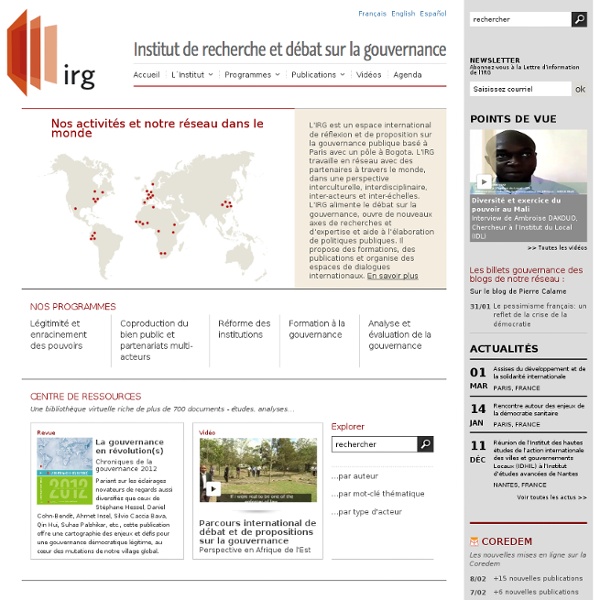IRG : Institut de recherche et débat sur la gouvernance - réseau de réflexion international sur la gouvernance publique
Une bibliothèque virtuelle riche de plus de 700 documents - études, analyses... Revue La gouvernance en révolution(s) Chroniques de la gouvernance 2012 Pariant sur les éclairages novateurs de regards aussi diversifiés que ceux de Stéphane Hessel, Daniel Cohn-Bendit, Ahmet Insel, Silvio Caccia Bava, Qin Hui, Suhas Palshikar, etc., cette publication offre une cartographie des enjeux et défis pour une gouvernance démocratique légitime, au cœur des mutations de notre village global.
IIMAA
SPIRAL
During the second international meeting of coresponsible territories, the new website for the SPIRAL methodology has been launched : wikispiral.org . The new website entirely replace this one, which will be kept for archiving. We are pleased to invite you to the 2nd International Meeting of the Territories of Co-responsibility which will take place in Mulhouse on 22|23 November 2012 . Please find attached the Programme of the meeting and the Registration form (mandatory) to be sent by October 31, 2012. We hope to see you all at this event, where all the European partners of the TOGETHER network for territories of co-responsibility, and many other "territories of co-responsibility" will be happy to share their experiences on this innovative approach. As a reminder, Mulhouse is the Lead Partner of the project TOGETHER for territories for co-responsibility which represents a network of eight European cities. Training sessions to the SPIRAL method - August to November 2012: SPIRAL website Content
Les Amis de la Terre : Les prix pinocchio du développement durable
Related:
Related:



